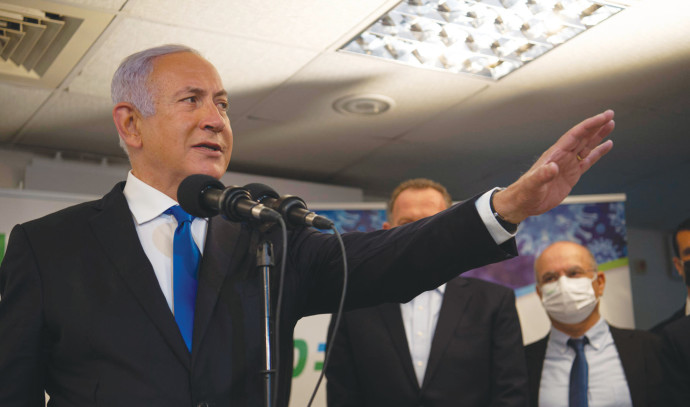Good news for Prime Minister Benjamin Netanyahu. Operation “Give a shoulder” to vaccinate the population of Israel and Netanyahu’s onslaught on the Arab sector are yielding first results. According to the Maariv-Sufashavua poll, the Likud party jumps to 32 seats, 4 more than in last week’s poll, with about 2 seats coming from the Arab sector.
The poll, conducted yesterday by Menachem Lazar, director of Panels Politics, predicts that if the 24th Knesset elections had taken place today, the Likud party led by Netanyahu would have won 32 seats compared to 28 last week. The strengthening is partly affected by the vaccination campaign, which yesterday crossed a threshold of 2 million vaccinated, and partly due to an increase of 1.5-2 seats from the Arab public, which Netanyahu decided to attack “shamelessly,” as he said in a zoom conversation with the Shulmanim, in which he stated his intention to gain 5 seats. In the sector.
“New Hope for Israel”, led by Gideon Saar, receives 17 seats in the current poll, a decrease of one seat compared to last week. Yesh Atid, led by Yair Lapid, remains stable with 14 seats. On the other hand, the right, led by Naftali Bennett, receives 12 seats in the current poll, and loses a seat in favor of the Religious Zionist Party led by Bezalel Smutrich, which does not pass the blocking percentage, but is close to it with 2.6%.
The joint list is strengthened by one seat and receives 11 seats. The explanation for this lies mainly in the decline in the percentage of Arab voters, who declare that they will not go to the polls in the upcoming elections, from about 30% to about 25%. As expected, there are no dramatic changes in the ultra-Orthodox bloc, with Torah Judaism and Shas receiving 8 seats each. Lieberman is also stable with 7 seats. Meretz with 6 and Blue and White with 5 seats, each rising by one seat compared to the previous poll.
On the other hand, the “Israelis” party, led by Ron Huldai, is unable to rise and continues the trend of weakening. In a poll last week, the party received 6 seats. In the midweek 5 survey, while in the current survey it drops, for the first time since its appearance, below the blocking percentage and receives only 2.5%.
Thus, the party led by Huldai joins nine other parties that do not cross the threshold and together “burn” about 14 seats, which will require a unification of forces in the center-left bloc: Religious Zionism led by Smutrich – 2.6%, Israelis led by Huldai – 2.5%, Jewish power 1.9 The New Economic Party, led by Yaron Zelicha – 1.9%, the Labor Party 0.9%, the Tnufa Party led by Ofer Shelach – 0.7%, Gesher by Orly Levy-Abaxis – 0.5%, Talam led by Moshe Ya’alon 0.4%, the Democratic Party of Protestants Balfour and the Israel Veterans Party, led by Danny Yatom – 0.0% each.
In terms of blocs – the Netanyahu-Haredi bloc stands at 48 seats, the bloc “Rak La Bibi” 60 and right 12. The survey was conducted on a representative sample of the adult population in the State of Israel aged 18 and over, Jews and Arabs alike. Maximum sampling error – 4.4%.
